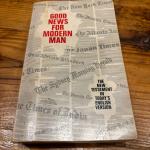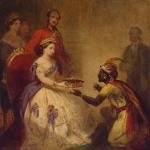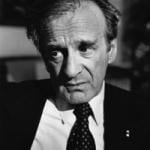Last summer was a time of reflection for my academic journey. First, I wrote a chapter in a book featuring the Hispanic faculty experience in the US, spending most of the chapter discussing the impact of books on my life. Second, I also had a piece about Cesar Chavez come out. I have reflected on the pragmatic struggles of teaching world history courses and being faithful to the global aspect of it. In some ways, my research has gravitated from modern European history and Karl Barth toward Latin America and Chavez.
Robert Chao Romero’s Brown Church was a crucial study to help me examine this shift. Romero declares that US Latino/as and Latin Americans have played an important part in Christian history, even though our textbooks have not given these stories much space—with the perhaps small exception of stories about violence and suffering. Romero’s book tries to correct this Eurocentric view. I was already in the midst of this type of reprogramming reading broadly from Latino/a and Latin American literature and history, which seemed somewhat disconnected from Barth and company.
One of my biggest takeaways about the last few decades of my life came through, you guessed it, the books I was reading. As Nadya Williams in her gracious words noted: I like to read, and read broadly. Another example of what shaped my perspective years ago was that Philip Yancey’s Soul Survivor captured my imagination, introducing me to a dynamic world of spiritual figures who also happened to love good books. Even though I decided a while ago that I would teach history, that did not mean that I would abandon the world of literature. In fact, it was upon receiving a friend’s copy of Fyodor Dostoevsky’s Crime and Punishment that I realized I wanted to pursue higher education. Yancey’s chapter on Dostoevsky (and Tolstoy) was the reason I initially picked up Soul Survivor. This book changed my life. I ended up picking the book off my shelf recently to thumb through it since I was in this nostalgic mood last year.
One of the subjects of Yancey’s book (that was not a 19th century Russian novelist) was the psychiatrist Robert Coles. I recall being fascinated by Coles’s story, especially mesmerized by his retelling of meeting Ruby Bridges. What I appreciated last summer was learning about his attempt at bridging the great literary works with the ethics of everyday living. In short, excellent literature is important to the way we live. Coles illustrates this lesson in his book about Dorothy Day. Day was a person known for her words and her actions. What is crystal clear in Day’s conversations with Coles was that she loved Dostoevsky (and Tolstoy, Dickens, etc.). Coles and Day kept returning to the great books and how much they served as a necessity to think long and hard about how we live with our neighbors.
What I was not expecting in this reflective year was to see the links between some of the biggest figures in US Christianity that I discovered through Yancey years ago and their concrete support of Cesar Chavez and the United Farm Workers (UFW). Studying Chavez’s peacemaking for the last few years led me to Day, who was an early and public supporter of Chavez, which then brought me to Coles. Coles, in fact, admired Chavez and dedicated his book on Erik Erickson to Chavez. Moreover, in published conversations with Daniel Berrigan in the early 1970s, Coles already lists Chavez along with Gandhi and King as non-violent dissenters who exemplify courage and wisdom in their work. One wonders how much influence Day had on Coles’s support of Chavez.
Thomas Malewitz’s article “From the Mountain to the Cross: Revisiting 1968 through the Prophetic Words of King, Kennedy, Chavez and Merton” is one of the few essays to place Chavez in this important history and not just as an afterthought. Most of the sources will discuss Chavez’s relationship with King (they never actually met, but did briefly correspond) and RFK’s support of Chavez is a legendary moment in UFW’s history. Even Romero’s chapter on Chavez in Brown Church does not dwell on this history. Why the relative historical silence?
What is often lost in the historical narrative about Cesar Chavez is his deep Christian faith. Two of Chavez’s favorite books were Loaves and Fishes by Day and Faith and Violence by Thomas Merton. Chavez was familiar with both St. Francis of Assisi and St. Thomas Aquinas. When we reflect about Chavez we do not really consider him as a man of words but mostly action (even though there are now multiple volumes of his speeches). Many of his chroniclers will emphasize the Catholic symbols of his marches and fasts. It is unfortunately rare for secular historians to look at the depth of his faith outside of its links to US Latino/a culture. In fact, some recent scholarship sees his religious commitments as an unnecessary burden that distracted him from his focus on labor issues. Another trend is to deemphasize Chavez’s role in the movement and begin to analyze the collective. Finally, a few biographers close their narratives with highlighting Chavez’s megalomania in his latter years.
Taken as a whole, the various studies about Chavez provide puzzle pieces in the never-to-be-completed puzzle of Chavez’s life. Hopefully the historians of the present-future will continue to add to the puzzle. My biggest hope is to see a bridging of these narratives to create a more well-rounded picture. Chavez, like many of our favorite American heroes, was a flawed man, yet he was also someone who counted Day as a model for nonviolent, Christian activism and a firm supporter of the farm worker’s movement. Perhaps some ways to start this process is a study of Merton’s influence on Chavez or Coles’s relationship to US Latino/a labor movements. These are just two subjects that deserve scholarly attention. If we take Romero’s concept of the Brown Church seriously then Chavez’s religious views will not be just one for Chicano studies scholars to perhaps ponder over, but a subject that sits comfortably within Christian history.













